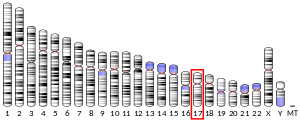- ^ a b c GRCh38: Ensembl release 89: ENSG00000174326 – Ensembl, May 2017
- ^ a b c GRCm38: Ensembl release 89: ENSMUSG00000040938 – Ensembl, May 2017
- ^ "Human PubMed Reference:". National Center for Biotechnology Information, U.S. National Library of Medicine.
- ^ "Mouse PubMed Reference:". National Center for Biotechnology Information, U.S. National Library of Medicine.
- ^ "UniProt". www.uniprot.org. Retrieved 2024-07-16.
- ^ Mardones L, Petermann-Rocha F, Martinez-Sanguinetti MA, Leiva AM, Troncoso-Pantoja C, Martorell M, et al. (November 2021). "Genetic variants in the SLC16A11 gene are associated with increased BMI and insulin levels in nondiabetic Chilean population". Archives of Endocrinology and Metabolism. 65 (3): 305–314. doi:10.20945/2359-3997000000359. PMC 10065347. PMID 33909378.
- ^ Williams AL, Jacobs SB, Moreno-Macías H, Huerta-Chagoya A, Churchhouse C, Márquez-Luna C, et al. (February 2014). "Sequence variants in SLC16A11 are a common risk factor for type 2 diabetes in Mexico". Nature. 506 (7486): 97–101. Bibcode:2014Natur.506...97T. doi:10.1038/nature12828. PMC 4127086. PMID 24390345.



